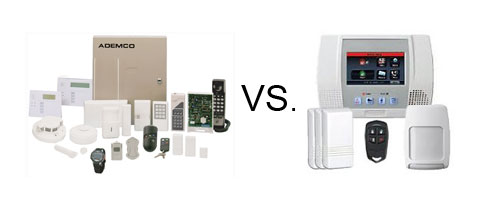
At the end of the day, selecting a wired or a wireless system depends on what you need from a security system. Hardwired alarm systems are the most reliable, while wireless systems provide easy installation and can be set up where wired systems can't be.
A security system can be divided two different parts:
- The sensors/contacts and the control panel that can be both wired or wireless
- The method the system uses to communicate with the outside world (the monitoring station) or the orders it receives from your cell phone (especially with a home automation system)
A fully hardwired alarm system connects the two parts with a network of wires concealed within the walls and floors of your home, and communicate with the outside world through your landline.
A fully wireless system uses sensors installed in your home which communicate individually and wirelessly with the control panel. Next, the control panel will communicate wirelessly to the outside world using a cellular line.
The two parts of the security system stated above can also be combined: A wireless control panel can be connected to a hardwired landline connection. Likewise, a hardwired control panel could communicate with the outside world through cellular.
Nowadays, the most common setup combines the two: a hardwired telephone line and a cellular backup in case of a landline breakdown.
Therefore, for a home security system, the choice of a wired versus a wireless system comes down to the importance you give to these two issues: installation concerns and performance differences.
If your home is not prewired for a security system, wireless systems will be your best choice. You won't have to drill holes or pull long wires along your walls and experience a flawless installation.
This system is particularly attractive to renters, historic homes, or buildings made in brick, stone or marble.
Wireless systems being portable, renters or homeowners will be able to disconnect and reconnect their systems to the new address easily.
Besides, each wireless sensor has its own battery, which can be really helpful in case of power outage while you are out of your home.
The potential complication you could encounter with a wireless system is a lack of reliability. Just like Wi-Fi, wireless security systems are subject to interference, which can cause problems such as triggering false alarms. Interference can come from many devices: baby monitors, remote controls, power lines, microwave & furniture like metal filing cabinets. However, while those events are possible, they're really not that common.
If your home has been prewired for a security system, your choice for a hardwired system might be influenced by an easier installation.
In fact, if you go with the same provider that originally installed the equipment, your system could be remotely activate with a phone call, or a quick visit from a technician to update the control panel.
If you want to choose another company, the activation can be as simple as reprogramming the control panel so it communicates with the new provider's monitoring station.
In some cases, a new control panel might be necessary, but if the wired system is still working, there is usually no reason to buy new hardware.
Most major security system providers offers both wired and wireless options, so your first responsibility will be to choose among the extended offers.